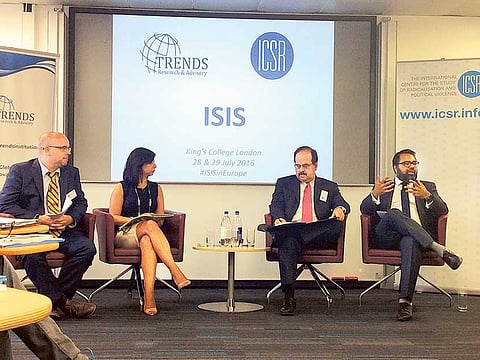‘Defeating Daesh requires far more than waging a war’
We need to challenge organisations attempting to use Islam for their political goals, says Al Hameli

Abu Dhabi: Defeating Daesh requires far more than waging a war to dismantle its networks and disrupt cells — an effective counter-ideological campaign to win hearts and minds and undermine its ideological appeal, a high-profile conference held recently in London heard.
“There has been progress in the military fight against Daesh but much less progress has been made in directing hearts and minds away from extremist ideologies,” Ambassador Alberto Fernandez, a former US State Department official who directed US efforts at counterterrorism communications, told the conference co-organised by TRENDS Research and Advisory, an Abu Dhabi-based think tank, and the International Centre for the Study of Radicalisation (ICSR) at King’s College, London, UK.
The conference brought together over 200 experts from government, research, policy, and private businesses.
Dr Ahmad Al Hameli, president of TRENDS, said, “We need to challenge organisations attempting to use Islam for their political goals. Religion cannot be exploited in the pursuit of violence. Furthermore, governments and media organisations need to work harder to find more effective ways to discourage the dissemination of extremist views.”
Experts from UK, France, Germany, Belgium, Italy, Spain and Denmark backed this up with evidence from various European states where security measures appear to be effective in preventing actual violent attacks, but much less effective in changing the mind set of extremists.
Richard Barrett, senior adviser to the Soufan Group and former member of the British Security Services (MI5) and former head of the UN Monitoring Team for Al Qaida, said we tend to look mainly at matters in Europe but there is extremist violence being carried out globally.
Barrett explained how Daesh pursues operations globally as their situation in Iraq and Syria comes under greater threat.
He stressed that European states should focus more on creating a stronger sense of resilience in the face of extremist threats as this works to counter the threat and prevent further support.
Dr Lorenzo Vidino, director of the Programme on Extremism at the George Washington University’s Centre for Cyber and Homeland Security, provided a telling example from Italy where the government is putting sufficient resources into counter-extremism but that these were focused on a hard approach to punish suspects; less resource is going into prevention activities which is, ultimately, more important.
However, he warned that effective practices for countering extremism cannot be a single model. Each country and society will have socially and culturally constructed differences that require more nuanced approaches.
Experts discussed how many young people in Europe face significant marginalisation in society and have few prospects for a productive future, making their susceptibility to extremist very high.
Equally, they argued, young people are seeing glamour in being a terrorist, and many of these individuals have no religious background or knowledge.
Experts made it clear that each society is facing diverse challenges in addressing the lure of extremism.
A number of experts made it clear that the lure of extremism occurs in both person-to-person contacts and through online platforms. Even though much evidence shows that individuals are being recruited into extremism through direct contact, the emotional impact of the online community is substantial and cannot be underestimated.
Charlie Winter, a global expert on Daesh’s propaganda efforts, explained that Daesh is putting significant effort into creating a “virtual caliphate” and that Daesh views the online/media operations as important as actual violence. He explained how the extremist organisations directly use online and media sources to demonstrate their so-called successes, to establish their position as a “brand” or product, and to intimidate others into believing their ideology.
Winter made it clear that many media outlets are irresponsible in the ways in which they present extremist-related stories and in many ways contribute to what the extremists desire.
Brian Fishman, policy adviser at Facebook, discussed how Facebook is taking these matters very seriously and is working to develop more sophisticated technologies, allowing it to prevent the spread of extremist views. They’ve been successful in preventing a large number of individuals from spreading their violent ideas but, given the size and scale of Facebook, this is a challenging area.
He also discussed how the pictures and stories used by extremists can also be used by counter narrative supporters, making the challenge even more difficult.
Christiane Hohn, principal adviser to the EU Counter-Terrorism Coordinator, said that from a governmental perspective they would like to see the companies providing online platforms to engage in more sophisticated monitoring of their use to remove or prevent extremist views being aired.



